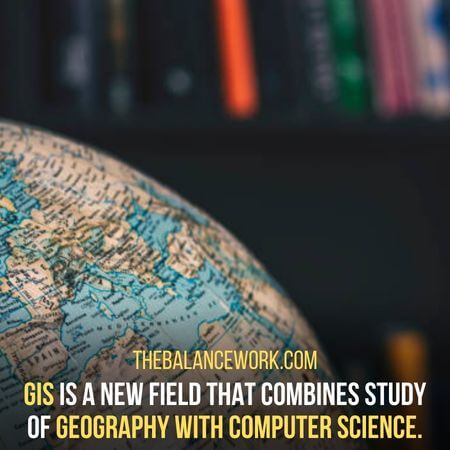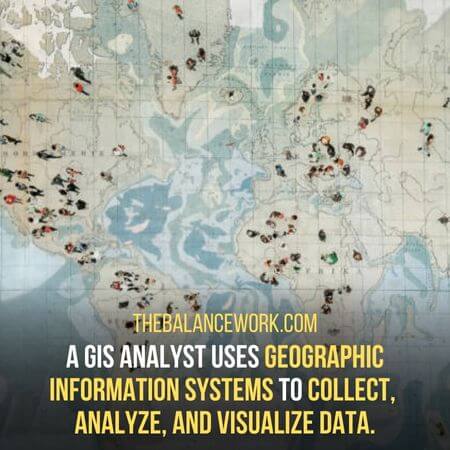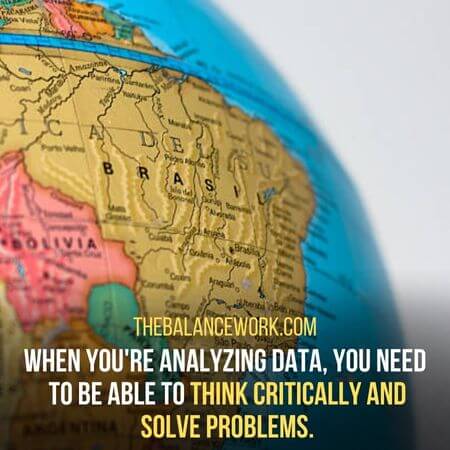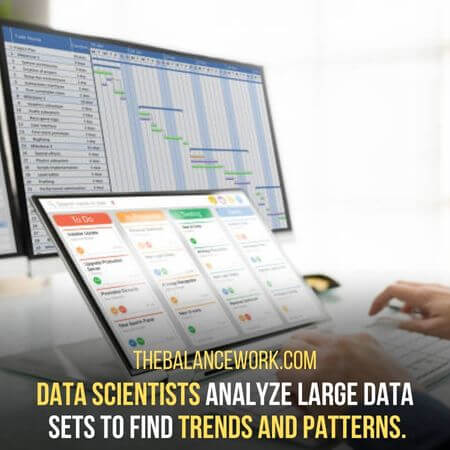Is GIS a good career path (Geographic Information Science)? For the most part, yes! GIS is a system that enables users to collect, analyze, and visualize data to solve problems.
It is used in various industries, from urban planning to natural resource management.
Is GIS A Good Career Path (Geographic Information Science)? Some Interesting Roles It Plays
The demand for GIS professionals will grow as more and more organizations adopt GIS technology.
Is GIS a new field? GIS is a new field that combines the study of geography with computer science.
What Does A GIS Analyst Do?
A GIS analyst uses Geographic Information Systems (GIS) to collect, analyze, and visualize data. They use this information to solve problems in a variety of industries, such as:
– Urban Planning
– Natural Resource Management
– Environmental Science
– Transportation

To know more about their job responsibilities, let’s refer below:
1. Analyze & Interpret Data:
What is the use of GIS if it can’t help us analyze or interpret data to solve problems?
That is the primary job responsibility of a GIS analyst – to make sense of all the data.
They use various techniques, such as spatial analysis. They identify patterns, trends, and relationships.
Spatial analysis is a type of data analysis that deals with locations. It helps us understand things like how two factors are related.
It also tells what the distribution of something looks like or where clusters occur.
Thus, in this way, GIS analyst helps to solve problems by analyzing and interpreting data.
2. Develop Maps & Visualizations:
Developing maps is another key responsibility of a GIS analyst. They use GIS software to develop both static and interactive maps.
Static maps are those that you see in books or hung on walls.
Interactive maps are those that you can zoom in and out of. And they include a feature to click on different parts to learn more information.
When creating a map, GIS analysts must take into consideration:
– The purpose of the map
– The target audience, and
– Level of detail
They also determine which colors, symbols, and fonts to use.
3. Write Reports:
GIS analysts also write reports. In these reports, they explain the results of their analysis.
They also make recommendations based on their findings. For example, a GIS analyst might write a report recommending that a city build more parks in areas with a lot of crime.
Or, they might recommend that a company expand its operations to a new location.
4. Present Data:
GIS analysts also present their findings to others. For example, they might do this on a map, chart, or table.
They might also give presentations to groups of people. For example, a presentation to city officials about results of crime analysis.
And when they present their data, they explain what it means and why it’s important.
5. Communicate With Other Scientists:
GIS analysts also communicate with other scientists. They might do this to ask for help with a project or to share ideas.

For example, they might talk to a climatologist. They may discuss the best way to map the data they have collected.
Or they might talk to a geologist about the best way to analyze the data they have collected.
6. Work With Technology:
GIS analysts also work with technology. They use computers to store, organize, and analyze data.
They also use GPS systems to collect data. And they use satellites to collect data.
So with a lot of knowledge and some training, you could become a GIS analyst.
GIS analysts also make a difference. Their work helps people make better decisions.
For example, their work might help people find the best place to build a new school.
Or their work might help people find the best place to build a new shopping center.
GIS analysts help people make better decisions about the world around them.
How Much Do GIS Analysts Make?
In the United States, GIS analysts make an average of $65922 a year. (Glassdoor)
When you become a GIS analyst, you can make a difference. You could help people make better decisions about the world around them. And you could earn a good salary.
Reasons GIS Is A Good Career Path (Geographic Information Science)
So let’s look at why GIS is a good career path.
1. GIS Pays Well:
As we saw from the data above, GIS analysts make a good living. The average salary for a GIS analyst is much higher than the median salary for all workers in the United States.
You can expect to earn a good salary when you become a GIS analyst. And if you move into a management position, you could earn an even higher salary.
2. GIS Is In Demand:
There is a growing demand for GIS analysts. As our world becomes more complex, there is a need for people who can help us make sense of all the data. GIS is the perfect tool for doing this.

This means that there are many opportunities for advancement. For example, you want to move up in your career. You can do so by taking on more responsibility or moving into management.
3. GIS Is Interesting And Challenging:
GIS is a fascinating field. It combines the best of both worlds: the analytical side of things and the creative side.
You’ll always enjoy working in GIS. There are always new challenges to keep you engaged. You’ll never find yourself in a rut because there is always something new to learn.
Reasons GIS Is Not A Good Career Path (Geographic Information Science)
Now there are some downsides to working in GIS, which I’ll outline below.
1. Not Many Job Opportunities:
The biggest downside to working in GIS has the few job opportunities. Some companies use GIS, but they are few and far between.
And even when there are job openings, the competition is fierce. The reason for this is that GIS is a relatively new field. It’s only been around for a few decades.
So, only so many companies know how to utilize GIS properly.
2. Requires Specialized Skills:
Another downside to working in GIS is that it requires specialized skills. You can’t just walk into a company and say, “Hey, I know how to use Google Maps. I can do GIS.”
You need to have specific training and experience with GIS software and hardware.

And with the ever-changing technology, you need to update your skills constantly.
So these are some of the reasons why working in GIS can be tough. But don’t despair!
There are also some great things about working in GIS.
Skills Needed To Succeed In GIS
Despite the challenges, there are many reasons to consider a career in GIS. GIS offers a great opportunity for those with the right skills.
Some of the skills you need to succeed in GIS include:
1. Technical Skill:
You need to be able to use GIS software and hardware. This includes being able to use a variety of software programs.
And you need to have an understanding of how to use GPS devices and other mapping equipment.
Some of the most popular GIS software programs include:
– ESRI ArcGIS
– MapInfo Professional
– AutoCAD Map 3D

Some other important skills you need for a career in GIS include:
– Programming
– Database management
– Web development
– Project management
2. Analytical Skills :
You need to be able to analyze data. This includes being able to understand and interpret data.
You also need to be able to see relationships between data sets.
When you’re analyzing data, you need to be able to think critically and solve problems.
So problem-solving and critical-thinking skills are essential for a career in GIS.
Analysis skills you need for a career in GIS include:
– Geospatial analysis
– Spatial analysis
– Network analysis
3. Communication Skills :
You need to be able to communicate effectively. This includes being able to write clearly and concisely.
It also includes being able to communicate your ideas verbally. You need to present data in a way that is easy for others to understand.
Some specific communication skills you need for a career in GIS include:
– Technical writing
– Storytelling with data
– Visualization
– Cartography
Alternatives To Consider
You may be into a career in GIS but not sure if it’s the right fit for you. Here are some alternative careers to consider:
1. Business Intelligence:
BI is turning data into insights that can help businesses make better decisions.
Business intelligence analysts use various tools to do this, including GIS.
With a background in GIS, you would be well-suited for a career in business intelligence.
They earn an average salary of $80664 per year. (Glassdoor)
2. Business Analysts:
Business analysts are responsible for analyzing data to help businesses make better decisions.
Their job is to understand the data and then present it in an easy way for decision-makers to understand.
Business analysts typically have a background in business, economics, or mathematics.
The average salary for a business analyst is $76082 per year. (Glassdoor)
3. Data Scientists:
Data scientists analyze large data sets to find trends and patterns.
With help of data science, businesses can make better decisions about products, & services.

Data scientists typically have a computer science, mathematics, or statistics background.
The average salary for a data scientist is $102848 per year. (Glassdoor)
4. Computer Programmers:
Computer programmers write code that tells computers what to do. They often work in teams with other programmers and computer scientists.
Programmers need to be able to think creatively and solve problems.
The average salary for a computer programmer is $74,811 per year. (Glassdoor)
Their main duties include:
– Updating software
– Fixing bugs
– Adding features
– Writing code from scratch
How To Get Into GIS (Geographic Information Science)
Let’s find out how you can get into GIS! There are many ways to get into this field, but some methods are :
1. Degree In Geography Or Environmental Studies:
Once you have a geography or environmental studies degree, you can specialize in GIS. This will give you technical skills and background knowledge to be successful.
With a degree in hand, you’ll be able to find a job as a GIS analyst or technician.
2. Certificate In GIS:
You can opt for a certificate if you don’t have the time or money to get a degree. A certificate will give you the basics of GIS, and you can further your education later.
Some employers may prefer candidates with a certificate, so it’s worth considering.
3. On-The-Job Training:
When it comes to GIS, there’s no substitute for experience. If you can get a job in the field, you’ll learn a lot just by doing the work.
Of course, you’ll want to supplement your on-the-job training with formal education. But it’s a great way to get started in the field.
There are all sorts of jobs you can get with GIS. You could be a cartographer working on maps. Also, you could be a surveyor, using GIS to collect data.
You could also work in urban planning, environmental conservation, or other fields.
The sky’s the limit regarding what you can do with GIS. And that’s one of the things that makes it such a great career path.
Final Word:
So is GIS a good career path? We think so! It’s a growing field with plenty of opportunity. And it’s a great way to use your talents to make a difference in the world.
If you’re looking for a challenging and rewarding career, GIS is worth considering.
Frequently Asked Questions
1. Is GIS A Good Career Path (Geographic Information Science) For the Future?
When it comes to job security, GIS is a great career path. The field is growing rapidly, and there is a high demand for skilled workers.
However, the field is also very competitive. To be successful, you’ll need to have a strong understanding of GIS concepts. And you need to be able to use the latest software.
And since there aren’t many GIS programs in colleges, you’ll also need to be willing to learn on your own.
So the future may be skeptical for GIS, but it can be a great career if you’re willing to put in the work.
2. Is GIS A Good Career Path (Geographic Information Science) For Women?
Regarding job security, GIS is a great career path for women. They usually work in office settings and have good benefits.
And the knowledge they gain can be used in many different industries. It is perfect for women who want a wide range of career options.
Last Updated on 2 years ago by Shahzaib Arshad
- Why Does My Boss Wink At Me? 6 Potential Reasons - October 5, 2023
- Is It Legal For Your Employer To Call Your Doctor? No, But… - October 4, 2023
- 12 Ways To Deal With A Low IQ Person - September 22, 2023